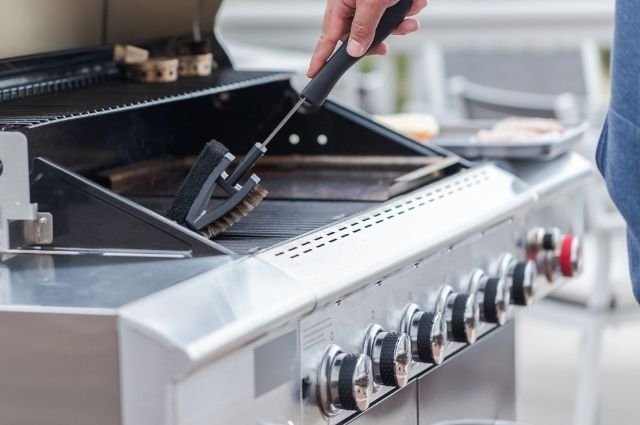For the best grilling experience, you should invest in a regulator for your propane grill in order to prevent unwanted occurrences. Yes, there are also some exceptions.
I will cover everything in this article. So, let’s get started!
how does a gas regulator work in a propane grill?
Regulators are valve-like tools. During grilling, the word regulator refers to three items (the regulator, the fitting, and the hose) that allow the flow of gas from the LP tank to the grill’s heating elements. Considering the importance of a gas regulator, we can mark it as one of the most important components of a grill.
By using a gas regulator, the user can adjust the pressure of the gas as necessary. Furthermore, it also acts as a protection between the flame and the tank. Safety is your first concern, so you might wonder if a propane regulator is necessary.
Do I really need a regulator for my propane grill?
It is literally impossible to connect directly to the tank and maintain gas flow without a pressure regulator. Moreover, gas grills operate similarly to gas heaters or gas stoves. Hence, one can easily understand why we cannot regulate propane grills without a regulator unless they are weed burners or system house propane.
Aside from this, propane gas pressure is also a concern when it comes to safety. Whenever propane boils and, simultaneously, converts to a gas phase, it produces enough pressure that it could rupture and burst piping or even the house at any moment. Basically, this is the reason you need a propane regulator for your grill.
Because safety is the utmost priority, all gas tools and kitchen appliances have a regulator. You will also encounter a regulator in any situation that involves natural gas.
Situations when you don’t need an additional gas regulator
The use of a gas regulator is not always required, as mentioned earlier. As for the weed burner, there is no need for a separate gas regulator since the needle valve serves as a regulator. House propane systems are another exception. In such a case, a regulator is already installed between your home and the tank. No additional regulator is needed.
Are all gas grill regulators the same?
Gas grill regulators are not all the same. Since LP regulators are usually part of the whole propane gas grill, the purpose is the same whether it’s a low-budget, mid-range, or high-budget regulator. Despite this, not all are the same. The quality and power of gas regulators also differ based on the quality and BTU of the burners.
In addition to the different types of grills, there are also variations in the regulators. Different regulators are required for these setups. Different models have different propane requirements as well. As a result, you will need different types of regulators, depending on your needs. Therefore, not all gas grill regulators are the same.

Differences in gas regulators
There are a number of differences between gas regulators. It is important to consider the number of hoses on each gas regulator when comparing them. Single-hosed gas regulators are common and standard. Dual-hosed regulators are also available as standard equipment. Each regulator has two separate hoses that can handle up to 60,000 BTUs.
If you have side burners, you might want to consider dual-hose models. A high-flow regulator is also the right choice if you have four or more burners. By using such a regulator, you can efficiently produce at least 90,000 BTUs. Thus, you have many options. Decide which is the best for you.
How do i know if my gas grill regulator is bad?
If you notice your gas regulator is not providing the grill with the necessary pressure, whether it is at high or low pressure, the gas regulator is malfunctioning. The failure of a gas regulator can also be detected by certain signs.
- When your regulator works fine, you will see the flame in blue color, and the flame height is all the same around the burner. But, when it fails to work properly, you will see the orange or awkward lazy yellow flame or something like that, but no blue.
- You will not be able to adjust the height of the flame smoothly and efficiently no matter how hard you try. However, a fine regulator will let you do that. You just won’t be able to operate the burner easily.
- You will hear a severe popping noise if you turn the gas burner on or off. Sometimes the burners will make something like roaring noises.
- You will also notice the flames to float on top of the burner ports. There will be air intake issues and the flames may soil out of the burners.
- Eventually, you will see heavy soot or heavy rusting issue sin the burners today or tomorrow.
Conclusion
A propane grill regulator is not only necessary for the convenient flow of gas, but also for safety and optimal performance. Furthermore, we do not want to risk anything for the lack of an affordable regulator. If you purchase one today, you can continue to cook happily and safely for the rest of your life. Any concerns you may have regarding the gas regulators, please let me know.
Recent Posts
All-purpose chef's knives, cook's knives, and other kitchen knives used daily for meal prepping fill overlapping roles of slicing, dicing, and chopping ingredients. However, the precise differences...
Bread knives have prongs to prevent the bread's soft interior from compressing downwards when sliced. As the knife presses down, the prongs allow pockets of air to escape sideways instead of getting...
